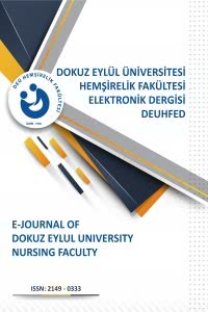Stomalı Bireylerde Uyku Kalitesinin İncelenmesi
Uyku Kalitesi, Kolostomi, İleostomi, Stoma Bakım Hemşireliği
Investigation of Sleep Quality in Individuals with Stoma
Sleep Quality, Colostomy, Ileostomy, Stoma Care Nursing,
___
- 1. Ağargün MY, Kara H, Anlar O (1996) Pittsburgh uyku kalitesi indeksinin geçerliği ve güvenirliği. Türk Psikiyatri Dergisi 7: 107- 15.
- 2. Baldwin C, Grant M, Wendel C, Hornbrook MC, Herrinton LJ, McMullen C, Krouse RS (2009). Gender Differences in Sleep Disruption and Fatigue on Quality of Life Among Persons with Ostomies. Journal of Clinical Sleep Medicine, (5): 4
- 3. Brand MI, Dujovny (2008). Preoperative Considerations and creation of Normal Ostomies. Clin Colon Rectal Surgery; 21: 5-16.
- 4. Buysse DJ, Reynolds CF, 3rd, Monk TH, Berman SR, Kupfer DJ (1989). The Pittsburgh Sleep Quality Index: a New Instrument for Psychiatric Practice and Research. Psychiatry Res; 28(2): 193-213.
- 5. Carlsson E, Berglund B, Nordgren S (2001). Living with an ostomy and short bowel syndrome: practical aspects and impact on daily life. J WOCN; 28(2):96–105
- 6. Cellini N, Duggan KA, Sarlo M (2017). Perceived sleep quality: The interplay of neuroticism, affect, and hyperarousal, Sleep Health; 3(3): 184-189
- 7. Çavdar İ, Temiz Z, Ozbas A, Can G, Tarhan F, Fındık UY, Kutlu FY, Akyuz N (2016). Sleep and quality of life in people with ileal conduit. Scandinavian Journal Of Urology, 50(6): 472–476.
- 8. Dickerson SS, Klingman KJ, Jungquist CJ (2016). Common meanings of good and bad sleep in a healthy population sample. Sleep Health; 2(3): 253-259
- 9. Furukawa C, Morioka I (2017). Health-Related Quality of Life and Sleep Disorders in Patients With a Urostomy. Is There a Relationship? J Wound Ostomy Continence Nurs;44(4):358-362.
- 10. Karadağ, A (2006). Stoma ve Yara: Hemşirelik Bakımı, Kolon ve Rektum Cerrahisinde Güncel Tedavi. Fazio VW., Church JM., Delaney CP Akçal T. ve Buğra D. (Çev. Ed.), 1. Baskı, 579-590, Avrupa Tıp Kitapçılık Ltd. Şti, İstanbul.
- 11. Kuo, T. B., Li, J. Y., Kuo, H. K., Chern, C. M., & Yang, C. C. (2016). Differential changes and interactions of autonomic functioning and sleep architecture before and after 50 years of age. Age (Dordrecht, Netherlands), 38(1), 5. doi:10.1007/s11357-015-9863-0
- 12. Morgenthaler T, Alessi C, Friedman L, et al (2007). Standards of Practice Committee, American Academy of Sleep Medicine. Practice parameters for the use of actigraphy in the assessment of sleep and sleep disorders: an update for 2007. Sleep; 30(4):519–529.
- 13. Scullin, M. K, & Bliwise, D. L. (2015). Sleep, cognition, and normal aging: integrating a half century of multidisciplinary research. Perspectives on psychological science: a journal of the Association for Psychological Science, 10(1), 97–137. doi:10.1177/1745691614556680
- 14. Şenol V, Soyuer F, Akça RP, Argün M (2012) Adolesanlarda Uyku Kalitesi ve Etkileyen Faktörler. Kocatepe Tıp Dergisi, 14: 93-102/ Mayıs
- 15. Vorbeck E, Willette-Murphy K, Meiers S, Rudel R, Alakhras M (2010). A Descriptive, Interventional Study to Assess the Impact of Surgical Stomas on Individuals’ Sleep Perceptions and Response to Sleep Hygiene Intervention. Ostomy Wound Management, 56(1): 36-44
- ISSN: 2149-0333
- Yayın Aralığı: Yılda 4 Sayı
- Başlangıç: 2008
- Yayıncı: Dokuz Eylül Üniversitesi Hemşirelik Fakültesi
Klinik Hemşireler İçin İş Doyum Ölçeği’nin Türkçe Formunun Psikometrik Özelliklerinin İncelenmesi
Duygu KARAARSLAN, Nesrin ŞEN CELASİN, Selin DEMİRBAĞ, Dilek ERGİN
Hemşirelik Öğrencilerinin Bireyselleştirilmiş Bakıma İlişkin Durumlarının İncelenmesi
Seçil Gülhan GÜNER, Özlem OVAYOLU, Nimet OVAYOLU
Stomalı Bireylerde Uyku Kalitesinin İncelenmesi
Deniz HARPUTLU, Deniz TALAZ, Deniz CENAN, Sercan KARADAĞ, Filiz ÖĞCE
Yaşlı Bireylerde Düşük Yürüme Hızını Etkileyen Faktörler
Süleyman Emre KOÇYİĞİT, Fatma Sena DOST GÜNAY, Ali Ekrem AYDIN
Servis Sorumlu Hemşirelerinin Dönüşümcü Liderlik Uygulamalarının İncelenmesi
Emel Arslan YILDIRIM, Fahriye VATAN
Üçüncü Trimester Gebelerde Konfor Düzeyi ve Etkileyen Faktörler
Semiha AYDIN ÖZKAN, Derya KAYA ŞENOL, Ergül ASLAN
Ameliyat Öncesi Açlık Süresinin Ameliyat Öncesi ve Sonrası Anksiyete Düzeyine Etkisinin İncelenmesi
Özlem BİLİK, Yaprak Sarıgöl ORDİN, Zeynep DEVECİ, Buket ÇELİK, Emel Sütsünbüloğlu, Özgül KARAYURT
Kentsel Alanda Yaşayan Yaşlı Kadınlarda Yalnızlık Sıklığı ve Etkileyen Faktörler
